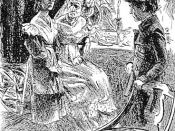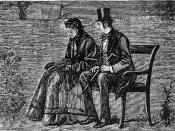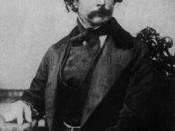The ideal state of mind that a person can achieve is called self actualization or to become fully human. Charles Dickens' Great Expectations told the story of how a boy named Pip worked to achieved this. More specifically, Dickens wrote how Pip learning from his experiences was able to put external factors, like social class, aside, and discover his own potential. Only after this discovery did Pip gain true independence and was able to accept himself with all his faults, including his social class.
It was Pip's ideas of social class seen in his early life that restricts him from accepting himself. Pip as a child first learned of social class from Estella. Pip's first experience of feeling lower appeared in the first scene with Estella; where Estella had insulted him and Pip was deeply affected:
I had never thought of being ashamed of my hands before; but I began to consider them a very indifferent pair.
Her contempt for me was so strong that it became infectious, and I caught it.(p.55).
This passage was a good example of Pip being ashamed of his social class and because of this had not been able to like himself. Pip eventually developed a fixed idea of social class and could not be satisfied as he was. This lead to his great desire of becoming a gentleman:
Well, then, understand once and for all that I never shall or can be comfortable - or anything but miserable - there Biddy! - unless I can lead a very different sort of life from the life I lead now.(p.120)
This referred to Pip's inability to accept being who he was born as, and because he could not do this he could not be content with himself.
Dickens writes that it was through...


